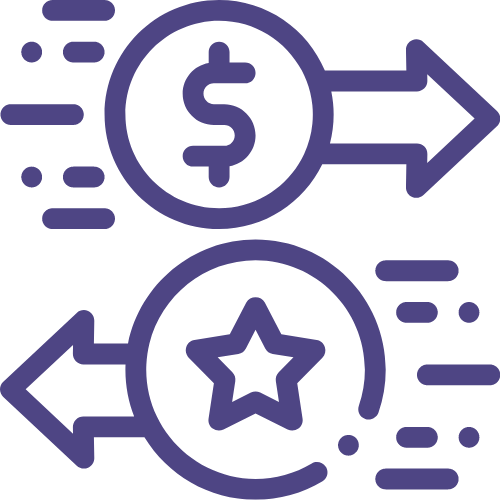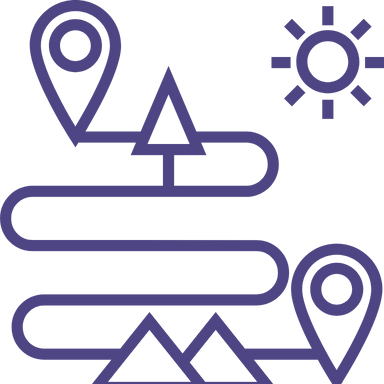Registration closes
00
DAYS
00
HOURS
00
MINS
00
SECS
“...I have found this is the best course I've ever done, and I dislike online learning. But this has really changed my mind about it. I've loved the generosity of this course. There's been so much extra to listen to, and everything that has happened online has been interesting. You're incredibly interesting as a presenter and speaker, and I've really enjoyed that, so there's been just so much, so I really want to thank you so much, Dr. Aimie, for what you've offered. It's just fantastic.
I think it's cutting edge, and I am really excited to be building this into my retreats and aspects of it. And as I go forward and to my life as I get well, so thank you."
- Rachel
“I'm a mom of four young children, and I can definitely now see when things happen in my children, I'm like, “Oh, I can see what's happening here,” and bring in support. So there was always such a safe container. In my personal life with my children and myself, I saw that there were some attachment pieces that showed up in situations. The awareness was still in that safe container. I was able to lean into that, listen, and go “Okay, how can I support this? What is this actually saying?” I can lean in and and help.”
– Christina Wiseman
"This has been a beautiful, rich journey for me.
I wasn't going to take the course again, and my little one just went into a temper tantrum like you wouldn't believe because she wanted this so much. And I'm just thankful that I listened to her. And I have just found home. I have found rest, and I have found the truth, and that has led to trust. And that has led to love. And that has brought me more joy than I have ever known before. And I'm so grateful because you show so much love to all of us, and we all know how much you care. I'm just very grateful for all that you are doing, and my little one really thanks you too."
- Leeta
This Journey is INTEGRATED!
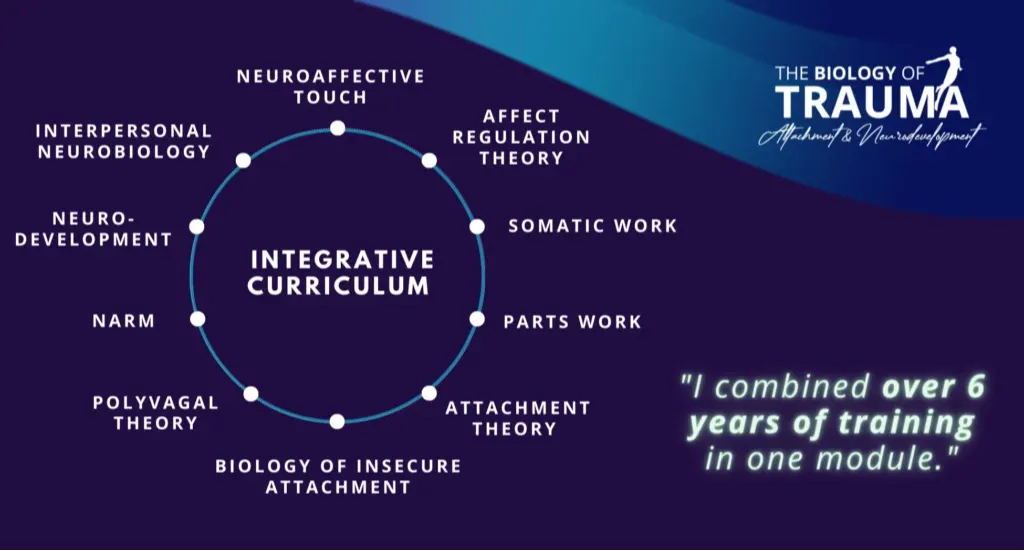
The 6-Step Journey
You'll be safely guided - one week at a time - through the 6 essential steps to gain understanding and tools to learn strategies to repair attachment pain and rewire neurodevelopmental gaps at any age.

Here Is The Step-By-Step Curriculum
WEEK 1: Attachment Is Regulation
WEEK 4: Autonomic Nervous System Development and PolyVagal Theory
WEEK 2: The Complete List of Needs Of Early Childhood For Healthy Neurodevelopment and Attachment
WEEK 5: The Biology Causes for Sensitivity, Reactivity, and Insecurity
WEEK 3: Brain Development and the Programming of Neural Circuits
WEEK 6: NeuroDevelopment-Informed Attachment Models and How to Repair
Schedule of Live Sessions
Live Somatic & Parts Work Session with Faculty Kimberly Erickson
Every Monday
- May 5th at 9:30 am PST
- May 12th at 9:30 am PST
- May 19th at 9:30 am PST
- May 26th at 9:30 am PST
- June 2nd at 9:30 am PST
- June 9th at 9:30 am PST
Somatic & Parts Work Drop Ins
Every Tuesday and Thursday
- May 6th at 12:00 pm PST
- May 8th at 4:30 pm PST
- May 13th at 12:00 pm PST
- May 15th at 4:30 pm PST
- May 20th at 12:00 pm PST
- May 22nd at 4:30 pm PST
- May 27th at 12:00 pm PST
- May 29th at 4:30 pm PST
- June 3rd at 12:00pm PST
- June 5th at 4:30 pm PST
- June 10th at 12:00pm PST
- June 12th at 4:30 pm PST
Collaborative Learning Lab
Every Wednesday
- May 7th at 9:30 am PST and 3:30 pm PST
- May 14th at 9:30 am PST and 3:30 pm PST
- May 21st at 9:30 am PST and 3:30 pm PST
- May 28th at 9:30 am PST and 3:30 pm PST
- June 4th at 9:30 am PST and 3:30 pm PST
- June 11th at 9:30 am PST and 3:30 pm PST
Coaching Sessions with Faculty
- Wednesday, June 4th at 9:30 am PST and 3:30 pm PST
Live Integration Sessions with Dr. Aimie and/or Faculty
Every Friday
- May 9th at 12 pm PST
- May 16th at 12 pm PST
- May 23rd at 12 pm PST
- May 30th at 12 pm PST
- June 6th at 12 pm PST
- June 13th at 12 pm PST

A conversation with Dr. George Thompson, exploring the transformative power of listening through the lens of Polyvagal Theory. In this exclusive session, Dr. Aimie and Dr. Thompson unpack how listening, safety, and co-regulation are foundational to healing attachment and supporting neurodevelopment. Together, they explore how the nervous system constantly scans for cues of safety, how trauma disrupts this process, and how we can create environments that rebuild trust, foster connection, and support secure relationships.

A conversation with Kim Barthel, offering a groundbreaking look at the complex sensory world of attachment and neurodevelopment. In this insightful session, Dr. Aimie and Kim explore how early sensory experiences shape emotional safety, survival responses, and our capacity for connection. Together, they dive into the ways sensory processing influences attachment patterns, relational dynamics, and nervous system regulation—revealing how felt safety begins at the sensory level and how healing unfolds through awareness and co-regulation.

A conversation with Dr. Frank Anderson, offering a heartfelt exploration into how trauma blocks our capacity to give and receive love. In this powerful session, Dr. Aimie and Dr. Anderson examine how early attachment wounds and survival strategies shape our relationships—and how healing begins with self-compassion and awareness. Together, they explore how trauma distorts self-perception, fuels disconnection, and keeps us stuck in protective patterns, while offering practical insights from Internal Family Systems (IFS) and parts work to help love flow freely again.
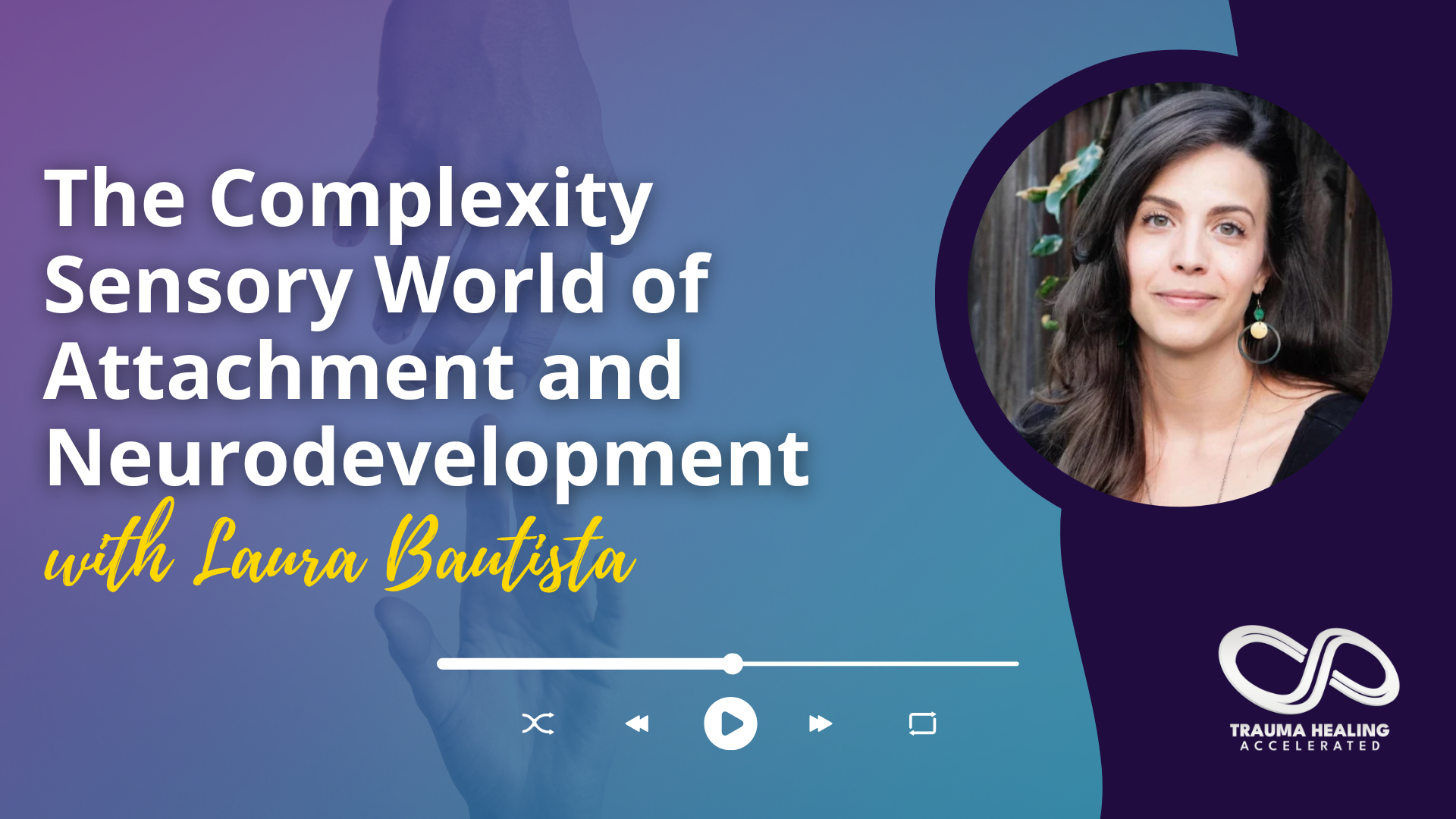
A conversation with Laura Bautista, diving into the often-overlooked pattern of Global High-Intensity Activation. In this enlightening session, Dr. Aimie and Laura explore how early stress—beginning even in the womb—can create a baseline of heightened arousal that affects emotional regulation, relationships, and resilience. Together, they unpack how this pattern shapes our experience of safety, contributes to burnout and hypersensitivity, and how completing activation cycles can support nervous system healing and greater ease in everyday life.

A conversation with Dr. Arielle Schwartz, exploring the hidden roots of self-sabotage through the lens of nervous system regulation and attachment. In this transformative session, Dr. Aimie and Dr. Schwartz unpack how early experiences, inner conflicts, and protective patterns shape self-defeating behaviors—often outside of our conscious awareness. Together, they reveal how somatic memory, parts work, and compassionate nervous system practices can help shift these patterns, supporting resilience, self-acceptance, and meaningful change.
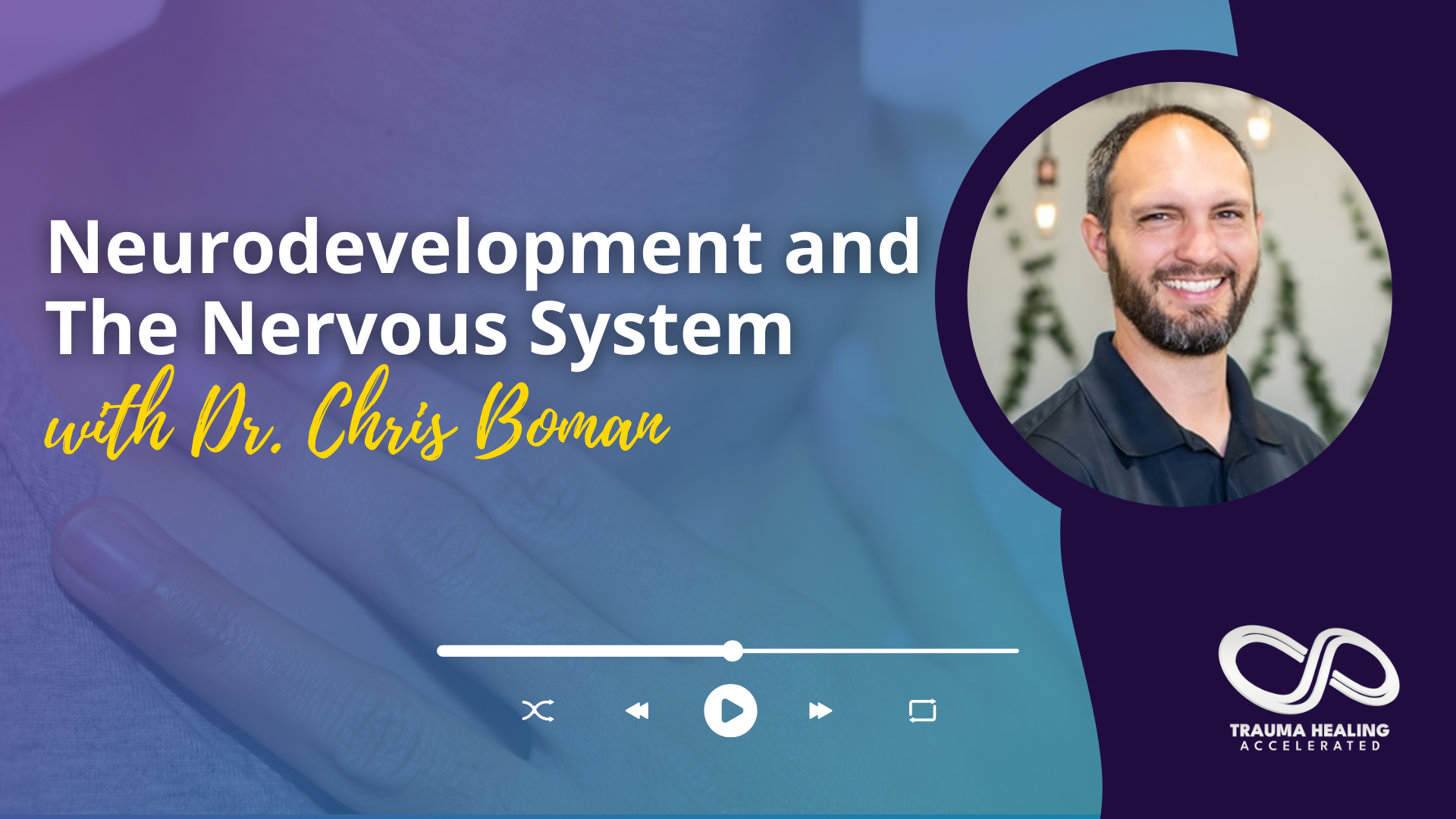
A conversation with Dr. Chris Boman, offering a unique biological and structural lens on neurodevelopment and the nervous system. In this insightful session, Dr. Aimie and Dr. Boman explore how birth stress, early misalignments, and proprioceptive deficits can shape the nervous system—and how these patterns can persist into adulthood, influencing regulation, behavior, and attachment. Together, they highlight how reconnecting the body’s structural and sensory systems can open new pathways for healing, presence, and resilience.

A conversation with Audra Snyder, sharing her deeply personal and powerful journey of parenting a child with reactive attachment disorder. In this heartfelt session, Dr. Aimie and Audra explore what it truly takes to rewire attachment in children who have experienced early trauma, adoption disruption, and deep mistrust. Together, they unpack the principles of therapeutic parenting—from containment and consistency to emotional neutrality, repair, and creating a felt sense of safety. Audra shares raw, honest stories of what it meant to parent without expecting love in return, how to read a child’s nervous system cues, and how small, intentional actions helped her son move from survival mode into deep connection.
Over 2 hours of content valued at $249!
As a special bonus, you’ll get two live Somatic & Parts Drop-In sessions every week — a powerful opportunity to integrate what you’re learning in real time.
This isn’t just another Zoom call. These live sessions are where the learning becomes real.
When you're working through attachment patterns, you don’t just need information—you need space to feel, to practice, and to experience safety in your body again. That’s why we’ve added these twice-weekly live Drop-In sessions.
These sessions are your opportunity to:
-
Get real-time support while doing the deep work
-
Practice somatic and parts tools in a safe, guided setting
-
Feel seen, heard, and connected—even when you’re still figuring things out
-
Shift out of your head and into your body, where real change happens
Held every Tuesday at 12 PM PST and Thursday at 4:30 PM PST
Each 45-minute session is led by a faculty. No prep needed—just come as you are.
If you’ve been on the fence, this bonus could be the support structure that finally helps you move forward with confidence. We added it because we know: healing doesn’t happen alone. And now, you don’t have to.

Who Is This Journey NOT For?
This journey is not a good fit for those that:
- dislike working in a collaborative group environment
- do not enjoy online learning
- do not have 1 hour weekly to invest in personal growth
- need a lot of one-one support or are looking for individualized coaching or therapy
Your Biology of Trauma® Instructor,
Dr. Aimie Apigian
Dr. Aimie is a double Board-Certified medical physician who specializes in trauma, attachment, addictions and addressing trauma on a cellular level. She earned her medical degree at Loma Linda University and has a Masters in Biochemistry as well as a Masters in Public Health. She trained for three years as a general surgeon before changing her career path.
In addition to her medical studies, Dr. Aimie has studied with and participated in Dr. Allan Schore’s Attachment Regulation Theory Study Group. She is a highly-trained somatic experiencing practitioner, trained in NeuroAffective Touch™, Internal Family Systems (Parts Work) and the Instinctual Trauma Response Model™. She continues to attend advanced trainings in Somatic Experiencing™ with Dr. Peter Levine and acts as an editor for Somatic Experiencing International.
She is not one to sit back and talk about problems. She is a solution-focused action taker- always looking for ways to improve our current method and accelerate the healing journey back to our best health and our best selves.

Frequently Asked Questions:
What is the Biology of Attachment and Neurodevelopment Module?
What is the schedule?
Are sessions prerecorded or live?
What if I miss or can't make a session? Will they be recorded?
What are the prerequisites?
I heard it is a part of the Biology of Trauma® Track. Can you explain this more?
What are the different tracks?
Can I change tracks?
Are the recordings available only to participants or are participants allowed to share the course material with outside people?
Can you tell me more about the two installment payments?
Do you provide references for your course materials?
How can I incorporate what you covered in the 21 Day Journey into the Attachment Module?
Do you accept late submissions of homework assignments?
Disclaimer: This is not a course that gives you a license as a provider nor is it a health or trauma recovery coach credentialing program. At the completion of each module, you will receive a Certificate of Completion indicating you have achieved competency on that specific topic of Biology of Trauma®. At the completion of all 6 modules of the Certificate Course, you will receive a certification as a Biology of Trauma® Professional from Trauma Healing Accelerated. This is a certification that you will be adding to your professional work capacities.
You are still held to the restrictions, responsibilities and privileges of your primary license and board.
Medical Disclosure: The information and programs presented on or through this website are made available to equip you with knowledge and tools. All the materials in this course are intended for educational purposes. This information nor any programs that are offered are (nor are a substitute for) medical advice, diagnosis, or treatment. For any physical or mental health issues, I recommend you work with a qualified health provider who will also support your desire to address the effects of trauma.




